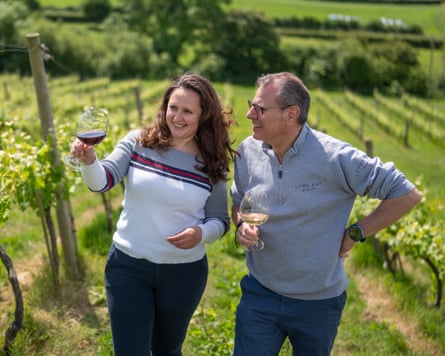They began by producing drinks more usually associated with the rolling hills of southern England – hearty ciders, warming tipples made from hedgerow fruits and good old-fashioned mead.
But Lyme Bay Winery in Devon is celebrating a bit of history having become the first English producer to win prestigious international trophies for both red and white wine in the same year.
Its Martin’s Lane Estate chardonnay 2020 and Lyme Bay Winery pinot noir 2021 won the English White trophy and English Red trophy respectively at the 2025 International Wine Challenge (IWC).
“We knew we had produced some really good wine that had aged beautifully,” operations manager Wolf Sieg-Hogg said. “We thought we’d be there or thereabouts but to take both prizes is wonderful.
“It’s a labour of love – the entire team has worked tirelessly to get here. It’s a huge moment for us – and for English still wine. English wine producers are the new boys on the world stage but we’re definitely on the up.”
The IWC judges were certainly gushing. Of the chardonnay, they said: “Burgundy eat your heart out! Spry, toasty oak with ripe peach, melon, and apples. Wholesome fresh dry flavours of wet stones, citrus zest and a long, lingering finish. Harmonious and expressive.”
They described the pinot noir as having “beautiful aromatics of autumn leaves, ripe cherries, dried herbs, and iodine”, adding: “The palate reveals ripe strawberry and cranberry, with appealing spicy details. A complex, textured finish completes this elegant wine.”
Founded 32 years ago and now employing 30 people, the Lyme Bay Winery is on a winding lane just outside the town of Axminster in East Devon (next to a vehicle reclamation yard and artisan coffee factory).
It still sells cider, hedgerow wine and mead but its decision to branch out into fine wines has proven a good one.
Rather than relying on its own vineyard, the grapes for its wine are sourced from all over southern England. The grapes for the winning chardonnay came from the Martin’s Lane estate in the Crouch valley, Essex and benefitted from the long, hot summer of 2020.
Grapes for the pinot noir were from Martin’s Lane and four other Essex vineyards. The summer of 2021 was cool but a late warm spell in October allowed an extended “hang time”, ripening the grapes nicely.

Sieg-Hogg said the ethos was not to be tied to one vineyard but to source the best grapes from the best vineyards. “We don’t go for quantity but for quality,” he said.
It means when the grapes ripen there is a race to harvest them and drive them across the country to Devon, where they are crushed and pressed and the “magic”, as Sieg-Hogg calls it, of turning the juice into wine in gleaming tanks and oak barrels begins. “You don’t get much sleep at that time,” said Sieg-Hogg.
after newsletter promotion
Once the butt of jokes, the English wine industry has begun to silence the cynics, with sparking wines such as those produced in the Camel valley in Cornwall leading the way.
The climate emergency has created excellent conditions for growing grapes, not just in the south of England but, increasingly, farther north and west in the UK. Extreme heat threatens to harm some more traditional wine regions, such as areas of Spain, Italy and southern California.

The Lyme Bay trophy-winning wine is not cheap – the chardonnay is £35 and the pinot noir is £29.99. Buy there are only a few thousand bottles of them and they will soon go.
There are cheaper “entry level” wines on offer and the winery sells to Aldi. “It’s about increasing the popularity of English wine, making it more accessible to more people,” said Steve Richardson, manager of the winery’s cellar door shop.
The visitor book at the shop shows that visitors from Australia, North America and continental Europe come here seeking out the Devon wines.
“The Scandinavians love our wines,” said Richardson. “The Australians come with very open minds; the French don’t like to admit how good it is.”

.png) 3 months ago
62
3 months ago
62

















































